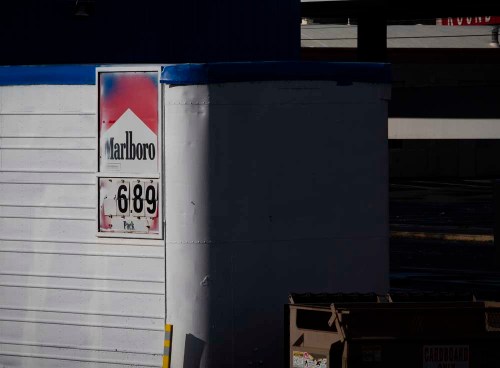Increased tobacco tax spells the end for at least two local shops
Published 5:00 am Tuesday, November 17, 2020

- A cigarette advertisement hangs from the back of Bare Bones Beer and Tobacco in Pendleton on Friday, Nov. 13, 2020.
UMATILLA — After 26 years of operating in Umatilla County, the last two remaining Cigarette Shop locations are closing for good on Dec. 31.
Sherdon Dietz, 79, is one of two remaining partners who own the small shops currently located in Umatilla and Milton-Freewater that specialize in the sale of cigarettes and other tobacco products, which are about to become more expensive to purchase in Oregon.
Oregon overwhelmingly approved Measure 108 earlier this month with two-thirds of voters voting “yes” to increase the tax on cigarettes by $2 per pack, along with adding the state’s first tax on e-cigarettes and increasing the tax on premium cigars.
The heightened rate will give Oregon the sixth highest tax on cigarettes in the country — a category it currently ranks 32nd in — but for Dietz it means cigarettes in Oregon will become more expensive to purchase than they will be across the border in Washington.
“The immediate effect is two stores, eight employees and a $16,000 a month payroll is gone as of Dec. 31,” he said.
The funding raised through the new tax is almost entirely earmarked for the Oregon Health Authority, which will receive 90% of the funds for treating sick people, specifically those facing mental illnesses. The other 10% will be directed for tobacco cessation efforts to tribal governments and “other culturally specific heath programs.”
Health officials are especially hopeful that raising prices on these products will reduce the number of Oregon youth who are picking up vaping products and starting habits that result in them ultimately picking up cigarettes.
According to Oregon Health Authority data, smoking leads to approximately 8,000 deaths of Oregonians per year and the number of Oregon’s youths who began vaping increased 80% from 2017 to 2019, while numerous national studies have concluded that teens who begin vaping are up to four times more likely to become cigarette smokers.
“When you put a tax on something, it always reduces the number of people who pay for it,” said Umatilla County Public Health Director Joe Fiumara. “We like the side effect of that because data is pretty clear that the sooner you can quit using tobacco, the sooner your body can really bounce back from the side effects of it.”
At the peak of his business, Dietz owned six shops specializing in the sale of tobacco with additional locations in Washington and Idaho that have since closed as state taxes have risen in those neighboring states.
Oregon hasn’t raised the state tobacco tax since 2002, and a measure most recently failed to pass in 2007.
In recent years, Dietz said each of his active stores averaged the sale of about 2,500 cartons of cigarettes per week, which he estimated about 80% of are purchased by Washington residents willing to travel south for the lower costs. While his stores also offer beer, Dietz said those sales only account for about $150,000 of revenue per year.
Dietz said the heightened taxes would result in his store paying roughly $3 million in both state and federal taxes, which he said can’t be outweighed by sales due to the expected reduction in Washington customers.
Supporters of Measure 108 projected the tax to raise roughly $160 million in additional annual funding.
Fiumara is supportive of directing that funding to other health programs, but is also concerned about the possibility for dwindling returns if the measure is actually successful in reducing smokers in the state.
“I continue to be nervous about a funding source that is reliant on an activity we’re trying to reduce,” Fiumara said. “The more successful we are, the less money we get. And while we want that end point, it’s a dangerous way to fund some of our programs, and so eventually there’s going have to be another mechanism for doing that.”
Andrea Jackson is the president of Tobacco Beverage Companies, which operates 67 stores in five Western states (Oregon, Washington, Idaho, Utah and Arizona) including three in Eastern Oregon.
Jackson said she’s concerned Measure 108 will hurt her businesses in Pendleton, Hermiston and La Grande, where her stores primarily sell tobacco and vaping products under the name Big Smoke. She said her stores employ roughly 30 people in the region, but are hopeful that their stores’ additional sales of beer and some grocery items will help offset the reduced tobacco purchases.
“I hope we make it,” Jackson said.
While disappointed in the measure’s passage, Dietz and his shops already made the tough decision to close preemptively before the tax takes effect on the first of the new year. But until then, he’s anticipating the smokers who have no plans of quitting in 2021 to keep burning through his product.
“I anticipate these next two months are going to be barn burners,” he said. “Then it’s going to be all gone.”









